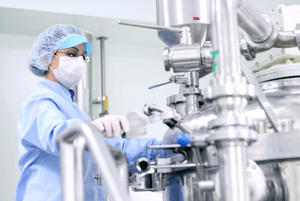Subscribe to the blog
Optimizing mAb purification with next generation protein A resin
Apr 10, 2019 1:52:57 PM / The Bio-Works Team
The market for monoclonal antibodies (mAbs) is constantly growing as mAb therapies are generally considered to be both safe and effective treatments for difficult diseases like cancer and rheumatoid arthritis. The growing global demand, as well as increasing competition, puts pressure on manufacturers of mAb products to improve their operations. There is a need for more efficient resins, as well as for innovative strategies to continuously improve purification processes. Bio-Works resins provide many benefits that help you improve your mAb purification process while at the same time achieving cost efficiency in your production.
Higher dynamic binding capacity and improved purity with smaller and smarter beads
Resins from Bio-Works belong to a new category of products, sometimes called “the next generation resins”. Typical characteristics of these kinds of resins are that they consist of small agarose beads with high porosity that are very stable even at high flow rates due to the specific cross-linking production method. This resin is also resistant to harsh cleaning procedures.

WorkBeads™ affimAb resin from Bio-Works has beads with an average diameter of 45 µm (approximately half that of conventional resins that have been used over the last decade). The industrial trend is to use smaller bead sizes, which, due to their larger surface areas (especially with high porosity beads), will enable you to bind more mAb. This allows for the use of less resin, smaller columns, lower solution volumes and requires a smaller footprint in the production area resulting in reduced production cost.
Our beads have been designed to have a high dynamic binding capacity – more than 40 mg mAb/ml resin at a residence time as low as 2.4 minutes, which of course is a very important factor for improved process economy.
The binding capacity at several different residence times for WorkBeads affimAb can be viewed in this study. The study also shows the dynamic binding capacity after a typical cleaning-in-place schedule using extended incubation with 0.5 M sodium hydroxide. All in all, data from the different flow rates before and after incubation with sodium hydroxide show that WorkBeads offer both a high dynamic binding capacity and efficient cleaning-in-place.
Efficient removal of impurities
Though an efficient protein A resin should have a high dynamic binding capacity for mAbs, it must also have a low non-specific binding of impurities. In general terms, using WorkBeads affimAb, our experiments indicate that you will achieve purity levels with a tenfold reduction of Host Cell Proteins (HCPs) and 99 percent removal of Host Cell DNA (HCD). The exact numbers, of course, will need to be determined from case to case. A few examples can be seen in the study described in the white paper that you can download at the foot of this page, where we have compared WorkBeads affimAb to a market leading resin, with or without the use of a multi-modal ion exchanger as a guard column.
The advantage of adding a guard column
Besides using a protein A resin that will enable you to achieve both a high dynamic binding capacity and a high degree of purity, an innovative strategy is to protect and prolong the life span of the protein A column. The advantage of using a guard column was investigated in the study mentioned above (download at foot of page), comparing the use of WorkBeads affimAb with and without a guard column from Bio-Works (WorkBeads 40 TREN) with the same procedure using a protein A resin from a market leading supplier. You can also read more about it here.
WorkBeads 40 TREN is a multimodal ion exchange chromatography resin with a ligand that is positively charged below pH 9 and that can be used for a variety of applications. When used before affinity chromatography, the study showed that WorkBeads 40 TREN was able to remove a significant amount of bulk impurities, thereby reducing the burden on the protein A column. The early removal of HCP and HCD will also enhance the final purity of the end product. Alternatively, only one polishing step might be necessary, with a major positive economic impact.
Bio-Works resins: designed for ultra-pure mAb therapies
mAb therapies often require high doses over an extended period of time. mAb products must therefore be ultra-pure to prevent accumulation of potential immunogenic components. The next generation of resins from Bio-Works makes it possible to achieve even higher levels of purity than conventional resins on the market.
Resins from Bio-Works have a base matrix of small-sized beads with a high dynamic binding capacity at high flow rates, which, besides efficient capture of mAbs, also facilitates efficient cleaning-in-place. In short, resins from Bio-Works can improve your mAb purification process, while at the same time helping you achieve cost efficiency in your production. And ultimately, this will contribute to assuring patient safety.
Improve your mAb purificationA simple step to improve mAb purity in any purification method. |
All product and company names marked with ™ are trademarks or registered trademarks of Bio-Works or of the respective trademark holders. Use by Bio-Works of trademarks of other holders does not imply any affiliation with or endorsement by them.
